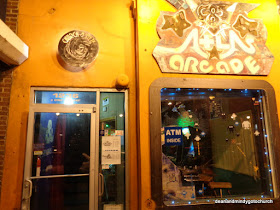Church and State: the American Bar
Sometimes we feel we have no choice
about which bar we should go to and write about. We had to go to an Irish pub on St.
Patrick's Day. We had to go to the bar in a Mexican restaurant on Cinco de
Mayo. When we discovered a bar called Church and State two blocks from where we
were staying in Washington, D.C., we had to go there. It's thematic to the
location and to our journey to visit a church and a bar in every state.
As if that wasn't enough reason, we're patriots who love the red, white and blue, and
this is a bar that loves America.
We were tempted (okay, I was
tempted) by the bar downstairs (but under the same ownership) with a video game
theme, but we walked up to the second floor and waited to be seated as the sign
at the top of the stairs told us to. The decor primarily went with the Church
theme -- stained glass, pews, and a pastor's study. For the State theme, there
were a few eagles, but the real emphasis on patriotism was in the menu.
It's printed like an old timey newspaper called The Church & State Times. The preamble to the drink list reads, "This not a Church. D.C. is not a State. But every bottle, whether heavenly or devilish, comes from the United States, its territories or possessions. We are the first all-American cocktail venue. Our craft cocktails take time, we appreciate your patience and invite you to be free and brave."
Patrick was sitting next to us at the bar. He's a regular, working in the area but not living nearby. He appreciates the small and intimate atmosphere of Church and State, since he doesn't like big bars or sports bars. In answer to what makes for a good bar, he continued with other things he appreciates about this bar. He likes the creativity of their cocktails and likes to watch the bartenders work. He likes to take mixology tips for making drinks at home.
Like many Washingtonians, our
bartender Victoria is involved in politics. Bartending is a side job for her;
she has a fulltime job in the District, working for what I agreed is a
"white hat" cause. She says she enjoys work at the bar as a creative
outlet, that it's "another skill that will help...in the long run,"
as she has short conversations with people and is able to quickly turn the
direction of the talk.
Mindy asked her our questions, "What makes for a good bar?" and "What makes for a good church?" Victoria said the booze is the obvious first thing -- having good options for people to choose. For her, though, she said that "even with good options, you need a good atmosphere." She likes a place that is a "little sexy, a little seductive," but that as a local, "I like being known -- the Cheers atmosphere." (She'd heard me mention Cheers when I was talking to Patrick. I need to speak more quietly.)
As for church, Victoria said she had
some bad experiences, but didn't elaborate. She said community was good, but
she wanted a degree of anonymity along with it. She doesn't want a small town
atmosphere, with people judging and everybody getting in her business.
We'd picked a fun night for talking
to staff. Christopher, who works there, though we forgot to ask what his job is,
said that a bar should have knowledgeable staff who know their drinks, and it
should have a low key, intimate atmosphere. He said a church should rebuke judgment
and be welcoming and accepting. He really doesn't think people in a church
should pass judgment.
I asked Ron what makes for a good
church, and he said the "subject matter of the minister matters" and,
"excuse the pun, the congregating of the congregation." If there are
young and old together, he believes that says something. He says a church must
also set a bar of excellence and maintain that bar (but a church does not
usually "maintain a bar," just to be clear).
Church and State Bar isn't about getting drunk; it's designed to give people an experience
they will remember rather than forget, and one that will keep them coming back.












No comments:
Post a Comment